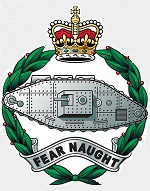Hobby Master HG3110 British Cruiser Tank, A27M Cromwell Mk. IV Tank - 2nd Battalion, Welsh Guards, Germany, April 1945 (1:72 Scale)
"Victory at all costs, victory in spite of all terror, victory however long and hard the road may be; for without victory there is no survival."
- British Prime Minister Winston Churchill
 The Cromwell tank was used by the British Army during the later stages of World War II. The Cromwell was ordered in 1941 and intended to replace the lightweight Crusader "cruiser" tank by being more heavily armoured, and, it was hoped, more survivable in battle. Its greater weight was to be driven by a 600-horsepower Rolls Royce Meteor engine, a derivative of Rolls Royce's line of aircraft engines. Initial models, however, were powered by other engines and were designated Cavaliers and Centaurs when they entered service in mid-1942. The first genuine Cromwells with Meteor engines entered service in early 1943.
The Cromwell tank was used by the British Army during the later stages of World War II. The Cromwell was ordered in 1941 and intended to replace the lightweight Crusader "cruiser" tank by being more heavily armoured, and, it was hoped, more survivable in battle. Its greater weight was to be driven by a 600-horsepower Rolls Royce Meteor engine, a derivative of Rolls Royce's line of aircraft engines. Initial models, however, were powered by other engines and were designated Cavaliers and Centaurs when they entered service in mid-1942. The first genuine Cromwells with Meteor engines entered service in early 1943.
The Cromwell tank weighed about 27 tons and had a top speed of 38 miles per hour and a range of between 80 and 170 miles, depending on the terrain. It was initially armed with a 75mm gun and two 7.92mm machine guns. The Cromwell's main assets were its speed, maneuverability, and ease of repair. It first entered battle in large numbers in mid-1944, during the Normandy Invasion and the ensuing campaign across northern France. From Normandy on, Cromwells and American Sherman tanks formed the backbone of British armored divisions. Like the Shermans, however, most Cromwells were outgunned by the more powerful German Panther and Tiger tanks. Cromwell tanks served in British armies until the war ended in Europe in mid-1945.
Shown here is a 1:72 scale replica of a British Cruiser Tank, A27M Cromwell Mk. IV tank that was attached to the 2nd Battalion, Welsh Guards, then advancing through Germany during April 1945.
Sold Out!
Dimensions:
Length: 3-1/2-inches
Width: 1-1/2-inches
Release Date: January 2011
Historical Account: "The Tower of London" - The 2nd Battalion, Welsh Guards, moved to Nijmegen in the fall of 1944 and from there they went twenty miles south to Veulen, after Veulen there remained to be cleared the Rhineland territory lying South of Nijmegen, as the Welsh Guards entered there had been heavy fighting. The 2nd Battalion Welsh Guards had been split up to support different Regiments. On February 16th, Number One Squadron was ordered to support the Coldstream Guards at Mull, it was a sorry day for them as the tanks got bogged down, one by one.
On March 30th, 1945, the 2nd Battalion Welsh Guards crossed the Rhine, on the 2nd April the 2nd Battalion were making for Oldenraal, they were crossing a salient of Dutch territory, Oldenzaal being a Dutch Town gave a tremendous welcome. Their advance was held up while blown up bridges were repaired. Number One Squadron was sent off to shoot up German transport, which had been reported, moving South - East, this was done successfully.
On April 18th, 1945, the 2nd Battalion reached Visselhovede, this is where the fun began, without any warning Headquarters were surrounded by German Marines attacking at close quarters. Headquarters managed to keep fighting, Number One Squadron soon joined the fray and the Marines soon realized they were beaten and surrounded, the total prisoners were Four Hundred and Forty with a Brigade Commander and his Staff.
On April 26th, 1945, the 2nd Battalion were in Westertimke, there was known to be an S.S Camp where guards lived on the hill leading down to Westertimke. Two German Officers came out with white flags asking for a ten-hour truce so they could evacuate the Prisoners of War. The sound of enemy transport was reported, so the Artillery shelled the Village before the 2nd Battalion moved in. The 2nd Battalion Welsh Guards had fought their last war.
The 2nd Battalion left Westertimke on the 29 April 1945 and passing back through Zeven turned northwards. On May 1st, they entered Stade and remained there for a week. After their long and toilsome journeying it was a great relief to rest in what was called a quiet old town.








